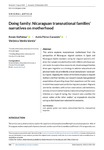Doing Family: Nicaraguan Transnational Families’ Narratives on Motherhood

Use this link to cite
http://hdl.handle.net/2183/30535
Except where otherwise noted, this item's license is described as Atribución-NoComercial-SinDerivadas 4.0 Internacional
Collections
- Investigación (FEDU) [938]
Metadata
Show full item recordTitle
Doing Family: Nicaraguan Transnational Families’ Narratives on MotherhoodDate
2022Citation
DePalma, R., Pérez-Caramés, A., & Verdía Varela, V. (2022). Doing family: Nicaraguan transnational families’ narratives on motherhood. Global Networks, 22, 308– 324. https://doi.org/10.1111/glob.12346
Abstract
[Abstract] This article explores transnational motherhood from the perspective of Nicaraguan migrant workers in Spain and Nicaraguan family members caring for migrant women's children. Our sample included families with children who have special needs, to explore how economically disadvantaged families draw upon migration as a strategy to address educational and physical needs not provided by a weak ‘exclusionary’ social policy regime. Applying the notion of the family display to migrant mothers and their families, our research reveals how gendered expectations of parenting shape their experience and the ways in which they explain and justify the migratory project. Migrants and family members, with certain reservations and limitations, actively reinvent motherhood by (re)constructing financial contribution as a type of caring. Our research also unsettles the classic notion of the ‘other mother’, as respondents describe caring as distributed over extended kin networks
Keywords
Care
Gender
Global care chains
Transnational families
Transnational migrants
Gender
Global care chains
Transnational families
Transnational migrants
Editor version
Rights
Atribución-NoComercial-SinDerivadas 4.0 Internacional






